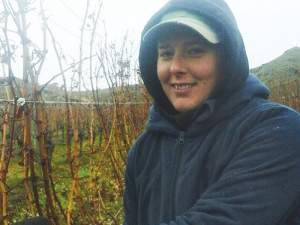Who's the glutton?
OPINION: We are told there is a wine glut - production outstripping demand worldwide - and the words 'wine lakes' are being thrown around.
 The 2018 Young Viticulturist of the Year, Annabel Bulk, at work pruning vines on the Felton Road vineyard at Bannockburn. SUPPLIED
The 2018 Young Viticulturist of the Year, Annabel Bulk, at work pruning vines on the Felton Road vineyard at Bannockburn. SUPPLIED
A love of working outdoors has led Dunedin-raised Annabel Bulk to a blossoming career in viticulture.
Bulk, an assistant viticulturist at the Felton Road vineyard in Bannockburn, Central Otago, has been named Young Viticulturist of the Year 2018 – only the second woman to win the title.
Runner-up last year, Bulk excelled in practical and theory modules in a competition held at Martinborough in late August.
Back at work in Central Otago, Bulk explained that the contest included interviews, a project presentation and a speech, and physical modules such as pruning and trellising – a very physical activity entailing posthole digging and wire straining.
“Obviously it’s meant to be challenging – that’s the point,” she told Rural News. “So you walk away from it feeling as though you’ve done a huge workout.”
Bulk, who was raised in Dunedin, says her love of the outdoors, of conservation and nursery work, is what brought her to the industry. She studied viticulture and winemaking in Marlborough, and has completed a Lincoln University viticulture degree.
She has now been working nearly seven years at Felton Road.
“I had to finish off my degree by doing some vineyard work experience and pretty much haven’t left.”
Bulk says there is a huge diversity of work to be done at Felton Road, as the vineyard is run on organic and biodynamic principles. “It keeps everything interesting and keeps you learning.”
Felton Road’s biodynamic methods include making their own compost and foliar sprays, and breaking down cow manure to create “an intense microbe inoculate” to encourage soil biology.
Biodynamics is essentially about looking after what is both above and below ground, she explains.
“We are focussing on trying to get a complete living biome around us, and that includes loving and looking after the soil and what’s happening underground as well as looking after the vines and the biodiversity in the vineyard itself.”
Winemakers like to talk of the “terroir” of a wine – a character derived from the land the grapes were grown on.
“You’re trying to create something of the land and of your parcel that you come from,” she explains. “So we’re looking after that and trying to create a healthy soil where everything leads on from that.”
Bulk says her goal for the next two or three years is to pass on her passion for the industry.
“I want to be able to focus on training and teaching the next lot of young viticulturists coming through.”
The Meat Industry Association of New Zealand (MIA) today announced that Chief Executive Officer Sirma Karapeeva has resigned from the role.
The winners of the 2026 Hawke’s Bay/Wairarapa Dairy Industry Awards were announced at the annual awards dinner held at Copthorne Solway Park in Masterton on Thursday evening.
Environment Southland is welcoming this week’s decision by the Environmental Protection Authority (EPA) to approve the release of Blaptea elguetai, a leaf‑feeding beetle that will help control the highly invasive Chilean flame creeper.
This March, the potato industry is proudly celebrating International Women’s Day on 8 March alongside the International Year of the Woman Farmer, recognising the vital role women play across every part of the sector — from paddocks and packhouses to research, leadership, and innovation.
Fruit trader Seeka posted a record profit and returns to shareholders in 2025.
Recent weather events in the Bay of Plenty, Gisborne/Tairawhiti, and Canterbury have been declared a medium-scale adverse event.

OPINION: A mate of yours truly reckons rural Manawatu families are the latest to suffer under what he calls the…
OPINION: If old Winston Peters thinks building trade relations with new nations, such as India, isn't a necessary investment in…